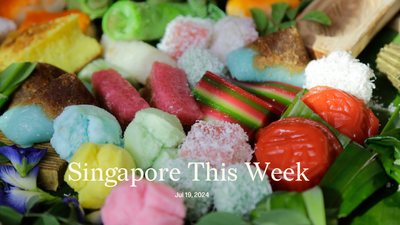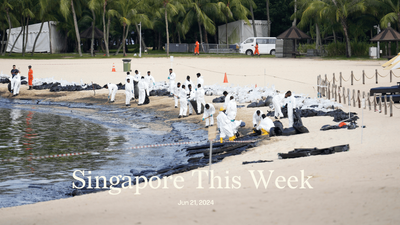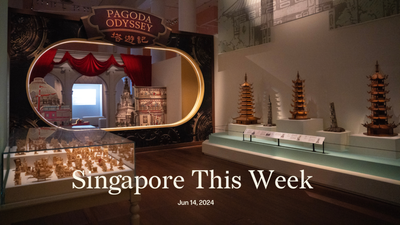Politics: Where the rich live
One reason the rich like living in Singapore is the absence of nosey journalists, whether paparazzi or investigative hacks. Yet they risk exposure if they buy an expensive property, especially a rare “Good Class Bungalow” (GCB). Shi Yonghong, co-founder of Haidilao, the wildly successful hotpot chain, probably felt a numbing sensation when he saw his name splashed across The Straits Times (ST) last week, after he bought an 18,255 sq ft GCB for S$50m from a company owned by Lee Wei Ling, Lee Kuan Yew’s daughter. ST also named Lee Hsien Yang’s wife and son, directors at the company. This will fuel suspicion that the story is another attempt by the establishment to portray Lee Hsien Yang and Lee Wei Ling as rich, money grubbers, part of the ongoing sibling feud between them and their elder brother, Lee Hsien Loong, the prime minister. Yet ST has long reported on GCB sales by private individuals. Curiously, it never reports on property purchases by senior public officials and politicians, anecdotally one of the wealthiest land-owning classes here, many in GCBs. Unlike almost every other democracy, Singapore does not require asset declarations from them (which are useful for monitoring conflicts-of-interest and stemming corruption). Singapore’s rich enjoy a reprieve from financial scrutiny—its politicians, even more so.
Politics: Thought police
While terrorist groups like ISIS must be condemned, at what point should the state intervene to stop the self-radicalisation of individuals? And what rights should we offer them? Given the abuse of due process at sites like Gitmo, we shouldn’t expect easy answers from liberal democracies. Still, it is worrying that we know precious little about the Singaporeans detained under the Internal Security Act. We got a slight glimpse this past week, when K Shanmugam, minister for home affairs and law, said that 78 out of the 92 Singaporeans detained since 2002 have been released and reintegrated. This includes 31-year-old Hazim Syahmi bin Mahfoot, who was detained for three years because he was allegedly friends with a terrorism financier, and “he believed he should undertake armed violence against the perceived enemies of his religion,” and 35-year-old Ruqayyah binti Ramli, detained for 10 months because she was allegedly radicalised by her Malaysian husband, and “supported his intention to travel to Syria to fight for ISIS.” Hazim and Ruqayyah ostensibly broke no law. Many Singaporeans would probably support the limited detention of those suspected to be on the verge of terror. But greater transparency and accountability are necessary to prevent abuses of power and to ensure that we treat suspects with decency.
Society: Ethnic minorities, people with disabilities, and LGBTQ persons the most discriminated in the workplace
More than half of the 1,000 employees surveyed by AWARE (Association of Women for Advocacy and Research) and consumer research firm Milieu Insight said they had encountered some form of discrimination at work over the past five years. Ethnic minorities faced discrimination at a much higher rate (89 percent) compared to those from the majority race (44 percent). Likewise persons with disabilities (78 percent) versus those without (50 percent); and LGBTQ persons (68 percent) compared to those who do not identify as LGBTQ (56 percent). By contrast, the difference between women (58 percent) and men (53 percent) was less pronounced. One in two of those who experienced discrimination chose not to report it. Common reasons are: not believing that discrimination was “severe” enough; not trusting authorities to act on the report; and not having enough evidence of discrimination. These results appear to contradict those from a Ministry of Manpower survey in 2021, which found that only eight percent of about 3,000 workers polled reported experiencing workplace discrimination over the past year. AWARE’s survey, despite the smaller sample size, seemingly has more robust questions, findings and a more appropriate time span (five years). AWARE hopes that they contribute to the drafting of Singapore’s upcoming anti-discrimination legislation, which should capture “...the full range of experiences workers face at all points of the employment cycle,” said AWARE’s executive director Corinna Lim. We agree. The new law should not get side-tracked by other imperatives, as Jom worried about in an earlier commentary.
Society: The costs of filial piety
The conciliation-first approach of the Maintenance of Parents Act has been a success, according to its commissioner, with about 90 percent of more than 2,000 cases resolved since March 2011. This has resulted in either both parties agreeing to a sum, or the parent withdrawing the claim for financial support. The Maintenance of Parents Act empowers some parents—those over 60 and unable to support themselves—to seek maintenance from their children who have the means to do so. This act, similar to those found in China, India and other parts of Asia, offers legal backing for long-held cultural practices. Once children in Singapore start working and become financially independent, they are often obligated to give a monthly stipend to their parents, as a sign of filial piety. This is an especially important safety net when parents, who are ill, jobless or widowed, are financially strapped and unable to pay for basic living and medical costs. The majority of seniors granted maintenance receive less than S$500 a month, barely enough to survive in one of the world’s costliest cities. Still, that some parents, in order to just get by, have to seek legal recourse against their kids is a societal tragedy. Parliament is reviewing the Act to see if it can be improved. One idea is to introduce non-monetary orders, which would mandate parents with an addiction, like gambling, to attend counselling before they can get financial assistance from their kids. No child wants to see their hard-earned dollars frittered away on the mahjong table.
Society: Understanding schizophrenia
A mother who killed her elder eight-year-old daughter has been acquitted of murder due to her mental incapacity. The court has ordered the woman, diagnosed with schizophrenia, to be held in prison until the law minister decides what to do next. According to the Criminal Procedure Code, the minister can have the person confined in a psychiatric institution, prison or other suitable place of safe custody. It’s a tragic incident, and the way it is being reported is important, as any insensitivity or attempt to sensationalise the case might do more damage to the way people with mental illness are perceived. Local papers, ST and TODAY covered the story in great detail, which gave their reports an air of neutrality. TODAY’s was more nuanced —its tone and language was more delicate and it took pains to explain, in an empathetic way, what persons with schizophrenia can experience. Unlike ST, Today also included at the end a list of resources for readers seeking help and support, which has become standard practice when reporting on mental health.
Arts: Margaret Leng Tan at Esplanade
Margaret Leng Tan, Singaporean pianist and Cultural Medallion winner, returns to the Esplanade next month to stage her new performance, “Dragon Ladies Don’t Weep”. The New York-based musician is an icon in the avant-garde movement and has shaped the genre of experimental music with her work on the toy piano. This performance will feature original music for toy piano, as well as other instruments Tan has used throughout her career — prepared piano, toys, and percussion. Winner of the Best Work of the Year (Dramatic) in the Australian Art Music Awards 2021, “Dragon Ladies Don’t Weep” is an autobiography that explores the pianist’s professional and personal history.
Arts: Singapore Writers Festival
The 25th edition of the Singapore Writers Festival, one of Asia’s largest literary events, will be held this November. This year’s festival theme is “If”, inviting speakers and participants to imagine new futures collectively. As always, the festival features a mix of local and international writers. 2022’s heavy hitters include poet Claudia Rankine (US), novelist Jeanette Winterson (UK), essayist and New Yorker staff writer Jia Tolentino (US) and science fiction writer Ted Chiang (US), whose short story “Story of Your Life” was the basis for the 2016 film “Arrival”. Early bird passes are available until October 14th via Sistic.
History weekly by Faris Joraimi
Malay blockbuster “Mat Kilau”, which became the highest-grossing Malaysian film in history in July, launched on Netflix this week to lukewarm responses. Directed by Syamsul Yusof, the historical action movie is based on an uprising led by a Malay chief of Pahang, Muhammad Kilau Bin Rasu, against British authorities in the 1890s. Singapore-born Adi Putra starred in the title role. Despite mass acclaim, Malaysian critics—of all races—have attacked its racist depictions of Chinese and Punjabis, as well as its all-too-familiar narrative of Malay ethnic nationalism. Also unspared was the cardboard acting, sloppy camera-work and cheesy dialogue brimming with calls to defend race and religion. The plot, like the screenwriters’ sense of history, is slender. Having watched it, I’m disturbed that many Singapore Malays are fans. Berita Harian and Berita Mediacorp, Singapore’s Malay dailies, ran reviews that praised its “noble” and “patriotic” message. The actual rebellion resulted from an interplay of factors, including the British seizure of privileges—such as taxation—enjoyed by Pahang’s powerful Malay nobility. Too weak to control his chiefs, Pahang’s sultan allied with the British. Ignoring these complex dynamics, the film turns Mat Kilau into a national hero, engaged in a holy struggle against infidel villains. Its world is one of demons and saints; there are only loyalists and traitors, not humans. My favourite online reaction contrasted its bleak vision of Malay heroism to 1961’s “Hang Jebat”, produced by Cathay-Keris, which balances valour with tenderness and moral ambiguity. The popularity of “Mat Kilau” reflects enduring racial anxieties on both sides of the Causeway, and the susceptibility of history to exploitation by toxic ideologies.
Tech: Easing the flow of today’s Chettiars
On the banks of the Singapore River is a sculpture of a Chettiar moneylender, representing the community that migrated from Chettinad, Tamil Nadu in the early 1800s, and played a crucial role in installing colonial Singapore’s financial plumbing. That entrepreneurial migration continues today, often in the form of fintech start-ups. Firms such as NIUM (formerly Instarem), which facilitates digital cross-border money transfers, and VoloPay, a “spend management platform” that helps SMEs better manage expenses, are operating across India, Singapore and other jurisdictions. Such overseas expansion will become easier after the Monetary Authority of Singapore (MAS) and India’s International Financial Services Centres Authority (IFSCA) signed an agreement to facilitate regulatory collaboration and partnership in fintech. Currently fintech start-ups in both countries take several months and have to meet numerous requirements to obtain the relevant licences for different financial products. The new agreement is expected to help start-ups get into the Singapore and Indian markets quicker through regulatory sandboxes. Perhaps one day the sculpture of a bare-chested Indian in a dhoti will be joined by a techie in a t-shirt and jeans.
Tech: TikTok’s slow dance
After informing its employees in August that the company doesn’t plan on going public soon, Bytedance, TikTok’s parent, has offered to buy back as much as US$3bn (S$4.2bn) of its own shares from investors at just under US$177 (S$250) per share. The buyback will allow Bytedance, the world’s largest private tech firm, to provide liquidity to some investors. However, the buyback price gives the company an implied valuation of US$300bn (S$424bn), 25 percent down from its peak of US$400bn (S$565bn). This dip comes amidst the increased pessimism about Chinese tech stocks after Beijing’s crackdown on the sector, as well as broader macroeconomic worries, including inflation and the ongoing interest rates hikes. The company told its 110,000 global employees in August that it will lower the price of its stock options by 20 percent, as a means to retain workers during a broader wave of layoffs across the Chinese internet sector. Based on a Linkedin search, there are more than 1,300 employees in Bytedance’s Singapore office, with the majority working on TikTok. They must be hoping that Gen Zs keep dancing, searching and buying.
Tech: Driving into Japan
Carro, a used car marketplace, will be expanding into Japan through a joint venture with its investor, SoftBank Corporation (SoftBank). It plans to provide car subscription services by working with thousands of dealerships across Japan. The leasing of cars has been an opaque process and Carro intends to use its AI technology to accurately predict the valuation of used cars based on their history and data, thus offering consumers a transparent buying and selling experience. Since it was founded in 2015, Carro has become South-east Asia’s largest online car retailer, with a strong presence across Indonesia, Thailand, Malaysia and Vietnam. The firm has raised over S$700 million from Softbank Vision Fund and several sovereign funds. Given the current downturn in Softbank’s portfolio, it would not be surprising to see Masayoshi Son, its founder, leasing a car from Carro.
If you enjoy Jom’s work, do get a paid subscription today to support independent journalism in Singapore.







